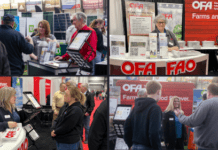By Drew Spoelstra, Executive Member,
Ontario Federation of Agriculture
Ontario farms are places of business, where animals are raised, safe and sustainable food is produced, and where a living is made. But they are also homes, where families are raised, and children play. Ontario’s agriculture industry is experiencing increased incidents of trespass, with activists illegally entering property, barns and buildings, breaching biosecurity protocols, and causing significant disruptions to the entire agri-food sector. Once lawful protests have escalated to barn break-ins, theft of animals, harassment and threats, and large-scale demonstrations which go beyond peaceful protest. These actions put the entire food system at risk. Without a healthy and sustainable value chain from farm to table, Ontario’s livestock and poultry sector cannot survive, thrive, prosper or profit. Individuals are entitled to their beliefs and have the right to protest. However, protests should never break the law, interfere with legal businesses, or endanger the safety of people or animals. In recent months, animal activism has escalated beyond peaceful protest. The rise in less-than-peaceful protests are cause for concern, as they not only threaten the personal safety and mental well-being of farmers, their families, employees, and the animals, it threatens the integrity of Ontario’s entire agri-food system.
Animal rights activism in the agriculture industry poses significant challenges down the entire value chain, including processing facilities, their workers, and livestock transporters. There is a real concern around processing plants, where animal rights activists stop livestock trucks, and create safety issues for all parties involved. Transport trailers are unable to quickly stop if someone suddenly blocks the roadway, and creates major safety concerns to the drivers, the animals, and the protestors. Activists enter the vehicle’s blind spots when they come up to the trailer and interfere with the animals, creating another safety issue as the driver cannot always see when they start driving again. Drivers face on-going abuse, including harassment, threats, and items being thrown at the vehicle and trailer. Not only do they affect the mental health of the transport driver, these actions can cause significant stress and harm to the animals on the trailer.
Lack of convictions and current fines within the judicial system aren’t acting as a deterrent. The new Security from Trespass and Protecting Food Safety Act, 2020 aims to do just that. The new legislation offers farmers, livestock transporters and processing plants new protections, and gives the judicial system new tools to address the extreme actions by activists aiming to end animal agriculture. The Act creates “animal protection zones”, which includes barns, livestock vehicles and processing facilities, and makes it illegal to enter barns or interfere with livestock transport without consent. The inclusion of designated animal protection zones will help to eliminate and reduce the risk of distress for farm animals and exposing livestock to disease and stress, as well as introducing contaminates to the food supply. Trespass protection is enhanced, with significant penalties for violations up to $15,000 for a first offence, and up to $25,000 for subsequent offences. Trespassers are also financially liable for damages as a result of their actions.
Comments and statements from those opposing the new act claim that it stifles free speech, impedes one’s right to protest and prevents exposing the abuse of farm animals. Concerns around the issue of animal abuse, and the ability and obligation to report such actions are en- trenched within the Provincial Animal Welfare Services (PAWS) Act, 2019, which came into effect January 1, 2020. Ontario farmers firmly believe in and advocate for the humane treatment of all animals, including livestock and poultry, and do not stand for animal abuse or neglect. The Security from Trespass and Protecting Food Safety Act, 2020 acts as a complement to the PAWS Act, and together, these pieces of legislation ensure the highest standards of animal care, protect people, animals, and the province’s food supply, while respecting lawful and peaceful protests. The new legislation does a commendable job at accomplishing the needs of the agri-food sector to keep the farm and food supply safe across the province, and provides the necessary protection of Ontario farms, families, employees, their animals and the safety of the entire food system.
Farmers are an integral part of the food value chain. We stand firmly with our partners in the transportation and processing industries to main- tain a safe and sustainable food system for all Ontarians.
Drew Spoelstra is an Executive Member on the Ontario Federation of Agriculture (OFA) Board of Directors. He is the Zone 5 Director representing the interests and priorities of OFA members in the region of Halton, Hamilton-Wentworth and Niagara.







